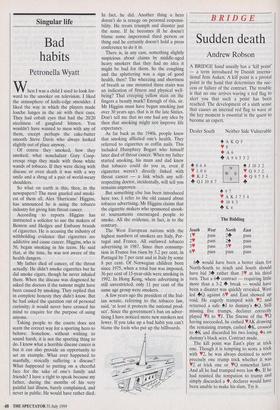Singular life
Bad habits
Petronella Wyatt
When I was a child I used to look for- ward to the snooker on television. I liked the atmosphere of knife-edge smoulder. I liked the way in which the players made louche lunges in the air with their cues. They had cobalt eyes that had the 20/20 steeliness of gangland hitmen. You wouldn't have wanted to mess with any of them, except perhaps the cake-batter smooth Steve Davis who always looked slightly out of place anyway.
Of course they smoked, how they smoked; what nonchalant Gary Coop- eresqe rings they made with those white wands of tobacco. If they were dicing with disease or even death it was with a wry smile and a shrug of a pair of world-weary shoulders.
So what on earth is this, then, in the newspapers? The most gnarled and smoki- est of them all, Alex 'Hurricane' Higgins, has announced he is suing the tobacco industry for giving him throat cancer.
According to reports Higgins has instructed a solicitor to sue the makers of Benson and Hedges and Embassy brands of cigarettes. He is accusing the industry of withholding evidence that cigarettes are addictive and cause cancer. Higgins, who is 50, began smoking in his teens. He said that, at the time, he was not aware of the health dangers.
My father died of cancer, of the throat actually. He didn't smoke cigarettes but he did smoke cigars, though he never inhaled them. When the disease was diagnosed he asked the doctors if the tumour might have been caused by smoking. They replied that in complete honesty they didn't know. But he had asked the question out of personal curiosity; it would never have crossed his mind to enquire for the purpose of suing anyone.
Taking people to the courts does not seem the correct way for a sporting hero to behave. Somehow, without wishing to sound harsh, it is not the sporting thing to do. I know what a horrible disease cancer is but it can also provide an opportunity to set an example. What ever happened to manfully, stoically suffering a disease? What happened to putting on a cheerful face for the sake of one's family and friends? I have a right to speak because my father, during the months of his very painful last illness, barely complained, and never in public. He would have rather died. In fact, he did. Another thing a hero doesn't do is renege on personal responsi- bility. He treats triumph and disaster just the same. If he becomes ill he doesn't blame some impersonal third person or thing and he certainly doesn't hold a press conference to do it in.
There is, in any case, something slightly suspicious about claims by middle-aged heavy smokers that they had no idea it might be bad for them. So the coughing and the spluttering was a sign of good health, then? The wheezing and shortness of breath as one mounted three stairs was an indication of fitness and physical well- being? That creeping yellow stain on the fingers a beauty mark? Enough of this, sir. Mr Higgins must have begun smoking just over 30 years ago, that is in the late Sixties. Don't tell me that no one had any idea by then that smoking might not improve life expectancy.
As far back as the 1940s, people knew that smoking affected one's health. They referred to cigarettes as coffin nails. This included Humphrey Bogart who himself later died of throat cancer. When my father started smoking, his mum and dad knew that tobacco could do you in, even if cigarettes weren't directly linked with throat cancer — a link which any self- respecting doctor, incidentally, will tell you remains unproven.
But something else has been introduced here too. I refer to the old canard about tobacco advertising. Mr Higgins claims that the cigarette makers who sponsored snook- er tournaments encouraged people to smoke. All the evidence, in fact, is to the contrary.
The West European nations with the highest numbers of smokers are Italy, Por- tugal and France. All outlawed tobacco advertising in 1987. Since then consump- tion in France has risen by 5.2 per cent, in Portugal by 7 per cent and in Italy by some 8 per cent. Of Norwegian children born since 1975, when a total ban was imposed, 36 per cent of 15-year-olds were smoking in 1992. In Hong Kong, where advertising is still unrestricted, only 11 per cent of the same age group were smokers.
A few years ago the president of the Ital- ian senate, referring to the tobacco law, said, 'at least it protects the national prod- uct'. Since the government's ban on adver- tising I have noticed more new smokers not fewer. If you take up a bad habit you can't blame the fools who put up the billboards.


























































 Previous page
Previous page